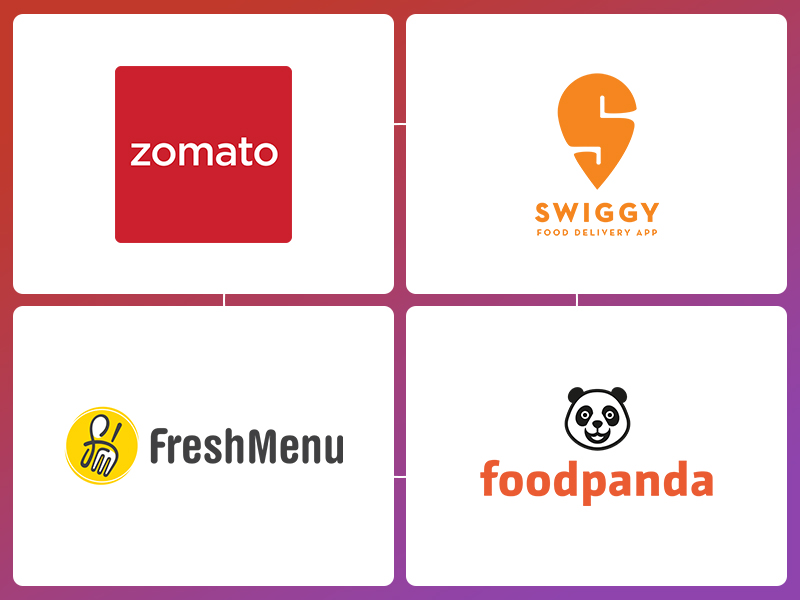
The Times of India reported that Indian online food delivery market grew by 150% in the year 2016.
The Indian food industry online is prone to high volumes of customer chatter. Concerns about delivery times, packaging, billing, wrong orders and quality of food are some of the reasons why customers end up conversing with an online food app daily.
As social media is a key medium for these apps to influence users and attract newer customers, a great social media customer service is a must. Their responsiveness, resolution time and volume of appreciation garnered on social media is visible to everyone and helps them fight competition.
This brings us to the question of who exactly rules the roost when it comes to customer service on social media. To answer this question, we’ve considered 4 popular brands – Zomato, Swiggy, Foodpanda and Freshmenu. Using a combination of personally studying each brand’s performance online and using Trooya’s Benchmarking feature, we have derived our results.
Before we proceed, here are the 5 parameters which we’ve considered:
- Personalization of responses: Were the published responses customized, personalized or heavily templated
- Quality of responses: Were the published responses well- written
- Resolution quality: Were the customers given a resolution or redirected to another channel of communication like email, phone call center or branch, and did the brand post a closure message after resolving
- Response rate: How many posts from the total volume of posts were responded to by the brand
- Response time: What was the average time in which a brand issued a response to a customer
Now, we’ll begin reviewing all brands on each of these parameters:
- Personalization of responses:
Zomato wants its responses to be highly personalized, so they don’t respond to customer queries from their official handle. Instead, their representatives manage customer queries from their own personal handles, making all their customer responses personalized in nature. While the responses are slightly on the formal side, they are personal and conversational. Look at how Zomato’s Parul helped Chirag to resolve his concerns.
Sorry to see that you’ve faced issues. Please DM me your contact number, we’ll reach out to you.
— Parul Gangwar (@ParulGangwar1) August 19, 2017
Swiggy’s responses certainly seem conversational and non-scripted. In the case below, the user complimented their food but wasn’t going to order because she was unwell. Swiggy responded in a friendly manner and wished the user to get well soon. It is commendable that they spend the effort to respond to both customers and non-customers!
Oh so sorry to hear that. Get well soon and then we’ll be happy to serve you again. 🙂
— Swiggy Cares (@SwiggyCares) August 17, 2017
Foodpanda’s responses seem templated. The giveaway is when a brand doesn’t even mention the customer’s name in their tweet. Sure, this approach does help in tackling high volume of responses, but what lacks is a personal connect with the user. The thing to remember is, if you have to use a template, let it be properly written and let it account for a variety of responses for each situation.
Hi, Apologies! We request you to DM us your registered contact details so that we can assist you. Team foodpanda!
— foodpanda India (@foodpandaIndia) August 16, 2017
Similar to Foodpanda, Freshmenu’s responses also seem templated, except that they name the customer. However, their templates are more formal and not conversational as evidenced by words like ‘shall inform’ and ‘concerned team’.
Hello Harsh,
We are extremely sorry about this. This should not have happened. We shall inform the concerned team immediately.— FreshMenuCares (@FreshMenuCares) August 21, 2017
Hi Yash,
We shall inform the concerned team about this. Thank you for sharing your order ID.— FreshMenuCares (@FreshMenuCares) August 20, 2017
- Quality of responses:
To see the quality of responses by the food app brands, we read around 50-100 posts from each brand.
Let’s begin with Zomato, who use several agents’ handles for responding to customers instead of a single customer care handle. Despite having multiple people speaking on their behalf, Zomato has managed to maintain a uniform quality of response. Most of their responses were apt, with only a few punctuation errors being observed.
In the below instance, Jayson Sethi responded to the customer in under 15 minutes but made some minor errors along the way. In his tweet, punctuation such as a period and comma were missing.
Hey,
The restaurant tried calling you regarding this however, you were unresponsive.Could you please DM me your alternate number.— Jayson Sethi (@JaysonSethi) September 26, 2017
Swiggy has a centralized customer care handle and thus has uniformity in all their responses. A majority of Swiggy’s responses are error free and quick. However, we observed instances wherein Swiggy’s response agents made spacing errors, due to which the user’s handle didn’t get tagged properly. An example of that has been shared below.
@DevallaRahulto the same. However we will definitely work to avoid such instances in future and make for the delay (3/4)
— Swiggy Cares (@SwiggyCares) April 10, 2017
Moreover, a response has to be as concise as possible on Twitter. However, Swiggy posts lengthy responses i.e at least 3 tweets on an average to respond to customer queries. While that’s not necessarily a bad approach, it does make the customer read multiple tweets to fully comprehend what the brand has to tell them. In that context, it isn’t the best approach.
@DevallaRahulto the same. However we will definitely work to avoid such instances in future and make for the delay (3/4)
— Swiggy Cares (@SwiggyCares) April 10, 2017
Foodpanda’s writing style for the most part appears to be formal and consistent. There were some grammatical concerns related to commas, which were observed in some examples.
We observed that the brand preferred to post lengthy tweets, which can sometimes be difficult for the customer to follow or understand.
Apologies! As discussed, the amount isn’t captured to the payment gateway yet, however, request you to wait till (1/2)
— foodpanda India (@foodpandaIndia) September 26, 2017
Freshmenu has a dedicated customer care handle, which tends to issue prompt and apt replies. Strangely, the Freshmenu team tends to mark a user’s handle, despite replying to their tweet. This is something unnecessary that they can avoid.
Hi @IndianChutney. We’re so so sorry! Please send us your order number and we’ll sort this issue out ASAP.
— FreshMenuCares (@FreshMenuCares) September 24, 2017
- Resolution quality:
Zomato tries resolving most of its customer queries online. They rarely ask for email correspondence. Their agents promise to investigate the query and get back to the customer at the earliest.
Hi @IndianChutney. We’re so so sorry! Please send us your order number and we’ll sort this issue out ASAP.
— FreshMenuCares (@FreshMenuCares) September 24, 2017
Swiggy is very apologetic for delays and inconvenience caused in the first level response. Nevertheless, they manage to resolve the query on the same channel.
Here is the recent case of Anshu Singh, who is really upset with Swiggy on not receiving a call back from the brand. They immediately apologized and stated the reason for their delayed assistance.
Hey Anshu, we’re really sorry that you did not receive the callback. Please allow us sometime sp that we can look into this.
— Swiggy Cares (@SwiggyCares) September 29, 2017
Hey Anshu, we’re really sorry that you did not receive the callback. Please allow us sometime sp that we can look into this.
— Swiggy Cares (@SwiggyCares) September 29, 2017
Foodpanda prefers resolving most of the customer queries on call. They ask for contact details in their first level response itself, irrespective of the kind of complaint it is.
Hi, Apologies! We’ve tried to contact you over the phone with no luck. Please share the suitable time to call you. Thanks!
— foodpanda India (@foodpandaIndia) August 28, 2017
Like Foodpanda, Freshmenu also prefers taking contact details to resolve the query over the phone. However, the brands take the query on a different channel only if the issue demands it.
It was also observed that Freshmenu posted closure messages more frequently than the other brands. It is a simple yet key practice that impacts your brand’s online image and gives a personalized touch to their social media customer service.
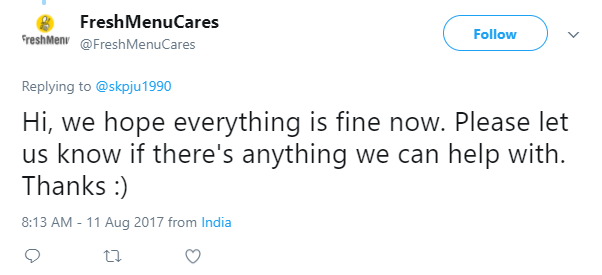
- Response rate:
Using Trooya’s Benchmarking tool, we derived the average response rate of these brands.
Note: We are not considering Zomato for comparison. Zomato usually attends to customer queries via the personal handles of their response agents, instead of their own handle. Hence, we are not able to fetch the data for response time.
Response Rate represents the number of customer queries having been responded to, out of the total number of customer queries present on a brand’s social media channels. Higher response rates are indicative of the brand attending to queries and concerns of most customers, if not all.
Having a response rate of 84%, Swiggy sits at the top of the mountain.
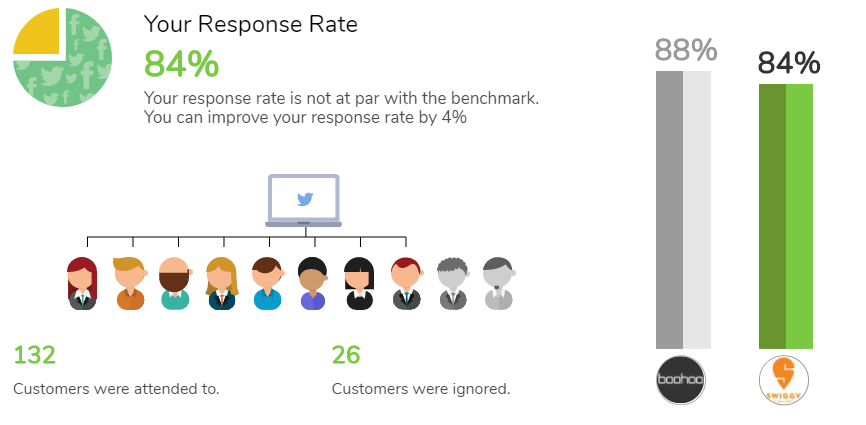
Foodpanda and Freshmenu have a long way to go since their response rates are 16% and 51% respectively.
Here is a graphical representation of the data, which is derived using our tool.
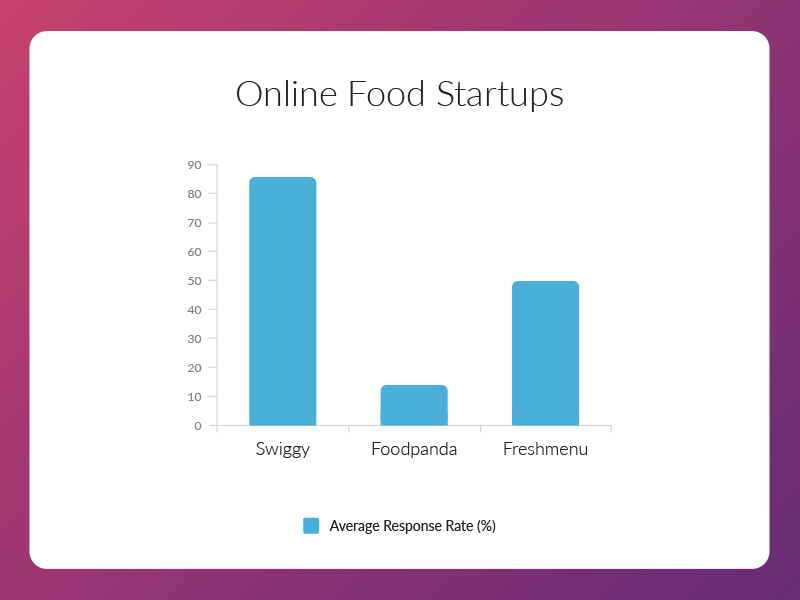
- Response time:
Using Trooya’s Benchmarking tool, we derived the average time taken by these brands to respond to customers on Twitter.
Note: Here also, we are not considering Zomato for comparison.
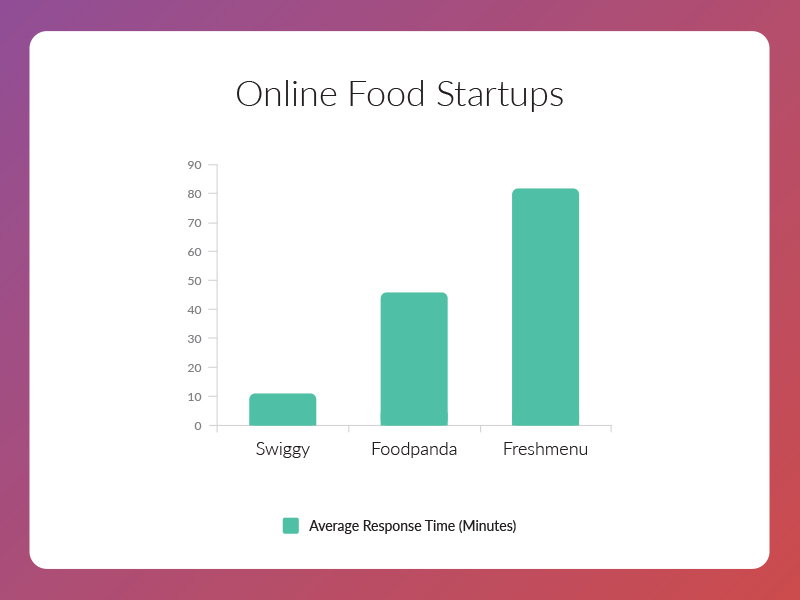
Customers who complain on Twitter ideally expect a reply within 30 minutes from companies. Swiggy seems to maintain a good response time 11 minutes. While Foodpanda managed to secure an average response time of under an hour i.e. 46 minutes, Freshmenu’s average response time was 81 minutes.
Take a look at how quick Swiggy is to respond to customers on Twitter with a TAT of 2 minutes:
Hey Aldrine! We’re extremely sorry for the delay caused. Kindly allow us time to check this.
— SwiggyCares (@SwiggyCares) September 18, 2017
Lowering your brand’s average response time is a major concern as delayed responses create a bad experience for customers on social media.
Based on our findings, we have given a weighted score to each parameter that is backed with a reason. This tabular format makes the comparison study of the listed apps easy to understand:
| Zomato | Swiggy | Foodpanda | Freshmenu | |
| Personalization of Responses | 4/5 | 3/5 | 2/5 | 3/5 |
| Reason: Zomato’s responses are friendly and personalized since they are responding to customers via their agents’ personal handles | Reason: Swiggy’s responses are personalized and casual | Reason: Foodpanda’s responses are mostly formal | Reason: Freshmenu’s responses are a mixture of formal and conversational | |
| Quality of Response | 3/5 | 4/5 | 4/5 | 4/5 |
| Reason: In the sample of responses we checked, 78% were accurate while the remaining had some typographical, grammatical and punctuation errors | Reason: In the sample of responses we checked, 86% were accurate. Errors were seen in terms of the customer’s handle being tagged incorrectly i.e. a few letters being written just at the end of a user’s handle, due to which the handle ceases to remain a link to the user’s Twitter profile | Reason: In the sample of responses we checked, 90% were accurate. Concerns were regarding punctuation and grammar | Reason: In the sample of responses we checked, 80% were accurate. Concerns such as a user’s handle being tagged twice were observed | |
| Resolution or Redirection | 4/5 | 4/5 | 4/5 | 5/5 |
| Reason: Mostly gives resolution with little redirection | Reason: Mostly gives resolution with little redirection | Reason: Mostly gives resolution with little redirection | Reason: Mostly gives resolution with little redirection. Freshmenu was also seen publishing closure messages frequently | |
| Response Rate (%) | N.A | 5/5 | 1/5 | 3/5 |
| Reason: 84% is considered as a great response rate | Reason: 16% is indicative of having a need to respond to more customer posts | Reason: 51% is a decent response rate. However, the brand has a scope of improvement | ||
| Response Time (Minutes) | N.A | 5/5 | 4/5 | 3/5 |
| Reason: 11 minutes is a great turnaround time | Reason: The response time of 46 minutes is close to the ideal response time i.e 30 minutes | Reason: The response time of 81 minutes is a bit more than the industry standard of about an hour, which is why Freshmenu got a lower rating in this parameter | ||
| Average weighted score | – | 4.25 | 3.15 | 3.6 |
To calculate an average weighted score logic was used. In the order of highest to lowest, most weight was given to Response time, followed by Resolution, Personalization of responses, Response Rate and Quality of responses which got the lowest weight.
In addition to the above ratings, a few key takeaways for any social media customer service manager are:
- Talk to the customer, don’t just respond: The brands which excel at social customer service are the ones who manage to create a conversation with their customers, even the unhappy ones. People like talking to people, not machines. When the customer understands that they are being listened to and understood, they consciously want to work with the customer rep.
- Quick response is a good response: A quick response shows a customer that they’re valued. It also helps reduce or eliminate negative feelings a customer begins to have against a brand. While a social media customer response published under 15 minutes is possible but too ambitious, that of an hour is certainly doable. Investing in an efficient team, proper tools and processes helps achieve that.
- Redirecting is a bad idea: Your Twitter or Facebook presence should ideally be a social media helpdesk for customers. Proper training can help your social media customer service agents to resolve customer concerns online itself. Redirection not only tarnishes your brand’s online image, but also is a time-consuming process.
- Keeping the language of your response error-free: It is always advisable for the response agents to spend adequate time to proofread their responses prior to publishing them. Additionally, brands should develop guidelines on the kind of language to be used by response agents on social media using a social CRM. Moreover, if your customer does not know the language well, they will have issues understanding the response, if it has typographical or grammatical errors.
Hope these learnings help your brand to enhance social media customer service!
For more such researched pieces, kindly subscribe to our blog.
